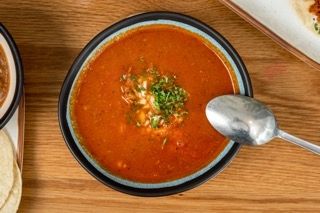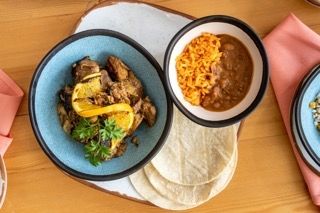Discover the joy of take out and delivery Mexican meals made fresh every day
Is Mexican Food Healthy And Balanced? Unpacking the Nutritional Conveniences of Conventional Ingredients
The inquiry of whether Mexican food is healthy welcomes an exploration of its typical components. Beans and corn offer as foundational staples, abundant in protein and fiber. Avocados give valuable fats, while different natural herbs and seasonings include taste and health benefits - mexican food. With each other, these components produce a tapestry of nutrition. However, the healthfulness of Mexican cuisine often depends upon preparation methods and section dimensions. What function do these factors play in identifying its overall dietary worth?
The Power of Beans: Protein and Fiber-Rich Staples
Usually neglected, beans offer as a keystone of Mexican food, offering a riches of dietary advantages. Rich in healthy protein, they are an excellent plant-based option for those looking for to fulfill their nutritional protein needs. This high protein web content supports muscle repair work and growth, making beans very useful for both vegetarians and meat-eaters alike. Furthermore, beans are an exceptional source of nutritional fiber, which aids in digestion and advertises a feeling of fullness, potentially aiding with weight monitoring.
The variety of beans used in Mexican meals, such as black beans, pinto beans, and kidney beans, adds to a varied taste account and can boost meals nutritionally. Beans are low in fat and consist of vital vitamins and minerals, consisting of iron, magnesium, and folate. With each other, these features make beans a crucial ingredient, supplying both nutrients and nourishment in typical Mexican price.

Corn: a Versatile Grain With Nutritional Advantages
Corn stands out as a versatile grain essential to Mexican cuisine, celebrated not only for its cooking applications but likewise for its outstanding dietary account. As a primary active ingredient in dishes like tortillas, tamales, and pozole, corn offers essential nutrients that add to a well balanced diet. Rich in carbohydrates, it works as a significant energy resource, while additionally being low in fat, making it a desirable option for different nutritional needs.
Additionally, corn is an excellent source of nutritional fiber, which assists in food digestion and advertises satiety. It has significant amounts of vitamins such as B-complex vitamins, which are crucial for energy metabolic process. The presence of antioxidants, specifically carotenoids, adds to overall health and wellness by reducing oxidative tension. Furthermore, corn is gluten-free, satisfying those with gluten level of sensitivities. Overall, the dietary benefits of corn underscore its value in conventional Mexican food and its function in a healthy and balanced diet plan.
Avocados: Healthy Fats and Nutrients in Every Bite
Avocados play a considerable function in Mexican cuisine, matching meals with their velvety structure and rich flavor. Beyond their culinary appeal, avocados are commemorated for their remarkable dietary account. They are an abundant source of healthy monounsaturated fats, which can help lower negative cholesterol degrees and support heart health. Additionally, avocados are packed with essential vitamins and minerals, including potassium, vitamin E, and B vitamins, adding to total wellness.
The high fiber content in avocados aids digestion and advertises satiation, making them a valuable enhancement to any kind of dish. Their one-of-a-kind nutrient structure can also support skin health and wellness and supply anti-inflammatory benefits. Integrating avocados right into standard Mexican recipes or enjoying them as a standalone treat can boost both taste and nourishment, demonstrating why they are a beloved staple in Mexican food. Overall, avocados supply a scrumptious method to delight in healthy fats and critical nutrients in every bite.

Flavors and Natural Herbs: Flavorful Wellness Boosters
While delighting in the abundant flavors of Mexican cuisine, one can not forget the important duty that spices and natural herbs play in boosting both preference and health and wellness. Active ingredients such as oregano, chili, and cilantro peppers not only add to the dynamic taste account but likewise give significant health and wellness benefits. Cilantro is known for its purifying buildings, helping to get rid of hefty metals from the body, while oregano is packed with anti-oxidants and has anti-inflammatory results.
Chili peppers, a staple in many Mexican dishes, consist of capsaicin, which has been linked to boosted metabolic rate and pain relief. Furthermore, flavors like cumin and coriander support digestion and may help in blood glucose policy. Integrating these tasty health boosters into dishes not just improves the culinary experience but also advertises total wellness, making Mexican cuisine not just scrumptious, yet likewise nutritionally useful.
Typical Food Preparation Techniques: Enhancing Nutrition and Flavor
Traditional cooking methods in Mexican cuisine play a necessary function in improving both nutrition and taste, as they often prioritize fresh active ingredients and classic methods. Methods such as nixtamalization, where corn is soaked and cooked in an alkaline option, not only enhance the nutrient profile of tortillas yet also improve their digestibility - lunch and dinner. In addition, making use of sluggish cooking approaches, like stewing or braising, allows tastes to fuse beautifully while preserving the stability of the components

Frequently Asked Inquiries
Are Mexican Food Portions Normally Larger Than Various Other Cuisines?
Mexican food sections are frequently bigger than those of numerous various other cuisines. This particular shows standard eating practices, highlighting communal sharing and hearty dishes, which can result in a more substantial offering dimension on the whole.
Exactly how Does the Prep Work Method Affect Healthfulness of Mexican Food?
Prep work techniques greatly influence the healthiness of Mexican food. Strategies such as barbecuing or steaming preserve nutrients, while frying can increase unhealthy fat web content. Choices of components and cooking styles ultimately establish total dietary value.
Can Mexican Food Be Customized for Specific Nutritional Limitations?
Mexican home food can without a doubt be tailored for particular dietary restrictions. Alternatives, such as using corn tortillas for gluten-free diet regimens or including more veggies, make it possible for people to delight in standard flavors while suiting various dietary needs.
What Prevail Misconceptions About Mexican Food and Health And Wellness?
Common misconceptions concerning Mexican food consist of the belief that it is inherently unhealthy, overly zesty, and exclusively focused on fats. In truth, typical meals commonly feature nourishing active ingredients and can be customized to various nutritional demands.
Are There Much Healthier Options at Mexican Dining Establishments?
Healthier alternatives at Mexican dining establishments frequently include smoked meats, beans, and fresh vegetables. Selecting meals that emphasize whole active ingredients and avoiding hefty sauces can lead to a more healthy eating experience, promoting overall well-being.
The range of beans used in Mexican recipes, such as black beans, pinto beans, and kidney beans, contributes to a varied flavor profile and can improve dishes nutritionally. Avocados play a substantial function in Mexican food, complementing dishes with their luscious structure and rich taste. Including avocados into standard Mexican meals or enjoying them as a standalone snack can improve both taste and nutrition, demonstrating why they are a precious staple in Mexican cuisine. While taking pleasure in the rich flavors of Mexican cuisine, one can not ignore the necessary role that spices and herbs play in enhancing both preference and health. Typical cooking from this source techniques in Mexican food play a vital function in enhancing both nourishment and flavor, as they often focus on fresh components and time-honored strategies.